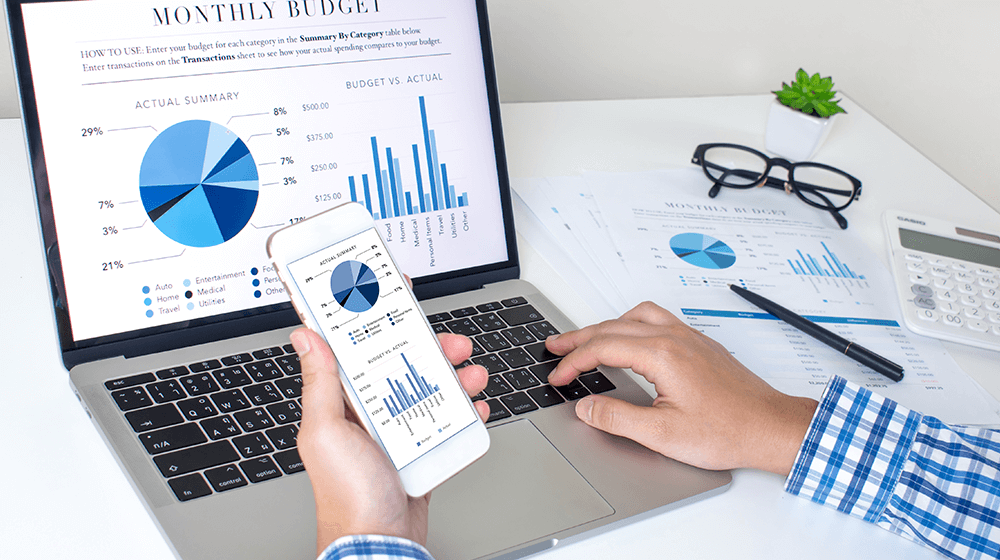
What is Accounting Software?
Accounting software offers features for tracking the revenue and expenses of a business. The best small business accounting software has a wide range of reports that allow you to analyze the financial health of your business, as well as dashboards that provide an at-a-glance overview of key financial aspects like accounts receivable, accounts payable, historical sales data and cash flow. Small business accounting software is also useful for tax management, ensuring you’re accurately estimating all your tax liabilities and saving money accordingly. The best accounting software integrates with other key business systems like payroll software and HR software, eliminating the need to enter the same data manually in multiple systems.
The Importance Of Accounting Software
Monitor Business Finances:
Accounting software in Malaysia or elsewhere allows monitoring accounts receivable, accounts payable and general ledger accounts. It enables business owners to understand their business financial position and problem areas of the business that need to be monitored carefully for future business growth and success.
Evaluate Business Performance:
Accounting software helps to evaluate business performance that shows whether the business is improving or depreciating. It ensures effective cash flow management. Accounting software allows making right business decisions as it gives a clear picture of the business. Business persons can reduce debt burdens and fulfill tax requirements of the business using it.
Quick and Accurate Calculations:
Business owners can perform all basic as well as advanced accounting tasks with accounting software and allows them to determine business success. It provides quick and accurate calculations therefore business owners prefer accounting software to prevent mistakes.
GST Ready:
It is important to meet tax requirements of a business therefore, accounting software in Malaysia or elsewhere comes with GST ready features. GST Accounting software track business financial position, calculate taxes, generate reports and provide calculations with accuracy that helps in making important business decisions.
User Friendliness:
Most of the accounting software is user friendly therefore; any person can use it without having any accounting knowledge. Business persons can maintain and manage their accounting needs of the business quickly and easily with it.
Evaluate your business needs before choosing any software program. Lots of software provider companies are available all over the world. Getting accounting software in Malaysia or elsewhere from a reputable company is important to get quality software solutions.

Features of our Accounting Software
1. Core Accounting
Accounting software should provide comprehensive support for core accounting functions, such as recording and categorizing transactions, managing the general ledger and the chart of accounts (COA) and generating financial statements and other reports. These functions are essential for tracking revenue, expenses and cash flow. For example, implementing MNF helped MD Restaurant Group quickly generate consolidated financial reports and automate bank reconciliation for 19 business entities, including multiple fast-serve restaurants.
2. Payroll
As companies grow, payroll quickly becomes too complicated to calculate and manage manually. That’s especially true for businesses that deal with such variables as multiple pay scales, overtime, benefits, sales commissions and contract workers. Integrated payroll management software automates payroll calculations, such as gross and net pay, payroll tax withholdings and health and retirement benefits. The software also creates mandatory W-2, 1099-MISC and other forms. Businesses can ensure that local payroll taxes in each jurisdiction are accurately collected and filed — a must-have feature for businesses operating in multiple states or countries.
3. Budgeting and Forecasting
Businesses can use a combination of historical and real-time data to create budgets and forecasts that help managers project future business performance. Companies can then track actual performance against the budget to identify and address any problems. Managers and financial specialists can drill into the details to pinpoint specific areas that have exceeded the budget, quickly identify issues and make adjustments to improve business performance. Analyzing the information also helps businesses create more accurate forecasts for the future.

4. Billing and Invoicing
Accounting software can accelerate cash flow by automating invoicing and collection processes. For accounts receivable, the software can automatically generate invoices, manage credit terms and improve payment collection with automated alerts and multiple payment methods. Accounts receivable staff can track the current status of all outstanding invoices, view each customer’s payment history and monitor key performance metrics.
5. Project Accounting
Many businesses need to account for revenue and expenses on a project basis. Examples are construction firms, consulting companies and others that undertake project-based work for clients. Software can simplify many of the specialized bookkeeping tasks required for project accounting by automating the allocation and tracking of project revenue and expenses. Project accounting enables companies to monitor progress against key project milestones and invoice customers as each milestone is reached. Managers can create project budgets based on the company’s previous experience and compare actual expenses with planned budgets in real time to determine whether adjustments and course corrections are needed.
6. Asset Tracking
Many companies have significant investments in long-term assets, such as machinery, vehicles and real estate, as well as short-term assets, like inventory. Tracking the value and other details of those fixed assets over their entire useful lifespan, which can span many years, can be complicated. That’s why many companies use fixed asset management software, as well as inventory management software, to track the company’s total asset bases. Fixed asset management software automates depreciation calculations, typically with the ability to use different depreciation methods for GAAP compliance and for tax purposes as necessary.

7. Reporting and Analytics
Accounting software helps businesses complete financial statements, such as income statements or balance sheets more quickly and accurately than using labor-intensive manual methods. But accounting software provides additional reporting features that help managers and financial specialists monitor the company’s business performance. Leading accounting software includes customizable, role-based, real-time dashboards and analytics that enable financial teams to keep tabs on key financial metrics and drill down to explore trends and issues. Advanced analytic tools provide detailed insights into the company’s current financial health. For example, managers can analyze data to identify the most valuable customers, payment trends and patterns in expenses.
8. Mobile Support
Cloud-based accounting software with mobile support lets staff access the information they need whenever they need it — whether they’re on the road, in an off-site meeting or working remotely. Employees have the ability to switch between desktop and mobile devices with the assurance that they’re always working with the most current data.
Mobile apps help staff continue managing their workflow while on the go. Some apps include customizable dashboards that let employees track key metrics, tasks and reminders, as well as enter and approve transactions. An important feature in mobile apps is the ability to work offline, so employees can continue working even when they’re not connected and upload the information later.

9. Tax Management
Accounting software simplifies tax compliance by automatically performing complex tax calculations in accordance with local, national and global requirements. This gives businesses greater confidence that they’re paying and collecting the appropriate taxes wherever they conduct business and that they have detailed line-item records available when needed. Leading accounting software lets businesses use custom rules to automatically calculate local tax obligations for both domestic operations and international subsidiaries, including U.S. sales taxes, goods and service taxes (GST) and value-added tax (VAT).
10. Integration
Integration with other applications is a valuable feature to look for, especially as the business expands and uses a broader range of business applications. Accounting software that’s integrated with an ERP suite, for example, eliminates the need to manually transfer data between applications within the suite. It helps ensure that financial data is always synchronized with information produced by other applications within the suite, such as sales and manufacturing data. It also reduces the likelihood of data-entry errors. Integration facilitates data sharing across the organization and gives every department a more complete view of the business in real time.
